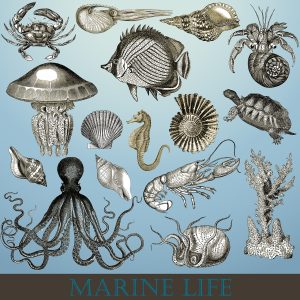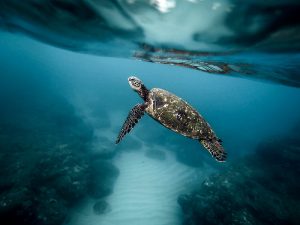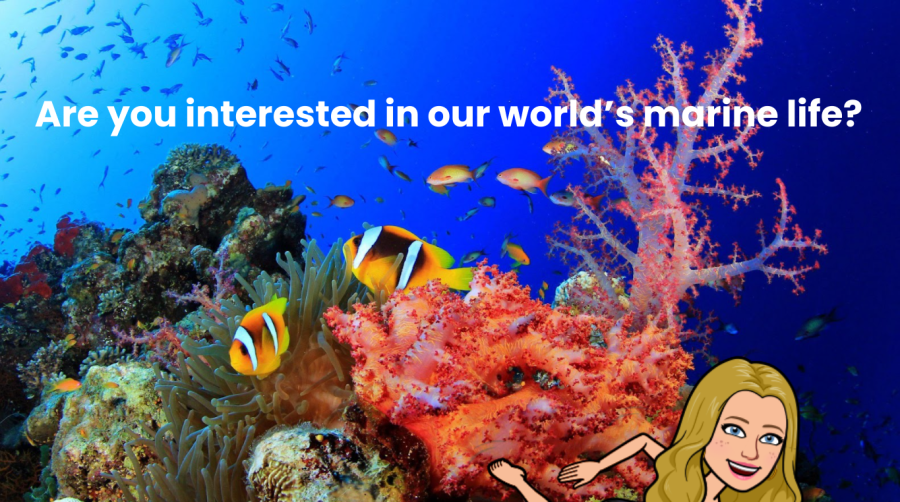Career Choices: My fascination with marine biology
Marine biology helps our world’s oceans; without them, the marine population would be in much more danger.
May 20, 2022
The ocean is home to nearly 95% of all life. Why wouldn’t we want to explore it? In fact, most of GenZ is worried about climate change and its effects. Have you considered that a career in marine biology can be both rewarding and have an impact on the world’s future?
Marine biology is technically the study of the ocean and everything within its depths, as well as other saltwater environments. There are additional majors and sciences focusing on freshwater biology. However, anyone can major in environmental science with a focus in these areas, which allows for more broad research.
Marine biologists study a variety of different fields and areas that are all unique in their own way. A few of the fields include microbiology, environmental marine biology, ichthyology, and marine mammalogy.
It is often that students or anyone interested in marine biology lean toward one area since there are so many different pathways. The science itself is very broad and diverse.
Advancing technology has widened the opportunities for ocean exploration. Any organisms’ behaviors and their interactions with the environment can be studied and used for research.
Marine biology is closely related to oceanography but they are not as similar as you may think.
According to Florida Tech News, “While oceanographers study the oceans themselves—the chemistry, physics, and geology of ocean systems and how organisms shape these systems, marine biologists study marine organisms—their characteristics, physiology, and life history.”

Microbiology:
Microbiology is the study of microscopic organisms. This can include viruses, bacteria, algae, fungi, slime molds, and protozoa.
Environmental marine biology:
Environmental marine biology is the study of ocean health. The scientists in this field determine the water quality to sustain a healthy environment.
Ichthyology:
Ichthyology is specifically of fish. This includes: bony fish, osteichthyes; cartilaginous fish, chondrichthyes; jawless fish, and agnatha. They can study fish’s anatomy, behavior and environment of fishes, as well how fish interact with other organisms.
Marine mammalogy:
According to Discovery of Sound in the Sea, “Marine mammalogy is a diverse field that often includes the study of animal behavior, communication, evolution, physiology, ecology, and zoology.” Marine mammalogists are able to study “the genetics, evolutionary relationships, population structure, community dynamics, anatomy and physiology, behavior and sensory abilities, parasites and disease, geographic distributions, ecological interactions, management and/or conservation of marine mammal species.”
As the sea levels continue to rise, marine biologists have become increasingly more important by the day. Warming waters are hurting animals and organisms in their habitat. According to Sarah Kaplan from The Washington Post, “Many species are slowly suffocating as oxygen leaches out of the seas. Even populations that have managed to withstand the ravages of overfishing, pollution and habitat loss are struggling to survive amid accelerating climate change.”
Marine biology is a great study for people who are passionate about our oceans. The oceans combined cover more than 70 percent of our planet, yet we have only studied and explored less than 5 percent of it. The ocean is our world’s biggest ecosystem and it remains a huge mystery. It is fascinating to think about all the things that could be living on our planet that we don’t know about.
Almost every state throughout the country have colleges that provide marine biology programs for their students, including the University of Maryland.
According to NOAA Fisheries, NOAA “offers internships that help students explore careers in Chesapeake Bay-related marine biology, oceanography, environmental education, and more.”
Now ocean life isn’t all we should be worrying about. Freshwater animals are just as important. Freshwater biology is a branch of limnology that studies ecosystems in freshwater environments.

According to Soft Schools, an online educational site for primary schools, “Freshwater ecosystems are divided into two subsections, lentic ecosystems (ecosystems that exist in still water) and lotic ecosystems (ecosystems that exist in moving water).” This can include rivers, springs and wetlands. A big study for freshwater biology is biochemical oxygen demand and how ecosystems are structured. “The need to understand freshwater ecosystems stems from the need to preserve human life.”
The study of freshwater biology provided information that stops harmful toxins, organisms, viruses, and chemicals from infecting freshwater ecosystems.
Fishing, pollution and rising temperatures all affect the ocean and marine science helps to try and prevent this and save our oceans.
Our ocean is responsible for fifty percent of the oxygen produced on Earth. We should all be doing our best to save our marine life, as well as their habitat. Doing this doesn’t only help them, but it’s helping us too.
According to the Institute of Marine Engineering, Science, and Technology, “Plants and animals act as indicators of the effect of human activities on the planet, including pollution and climate change.”
Marine study plays a huge part in identifying issues that are developing and expanding everyday. Another thing they do is monitor the amount of salt in bodies of water and maintain ecosystems. Healthy ecosystems benefit our world in so many ways.
Healthy ecosystems “provide services including food security, feed for livestock , raw materials for medicines, building materials from coral rock and sand, and natural defenses against hazards such as coastal erosion and inundation”, according to Geo Blue Planet, which is a network of ocean and coastal-observers.



